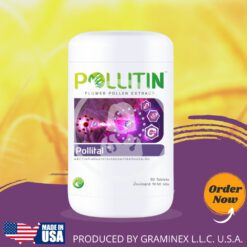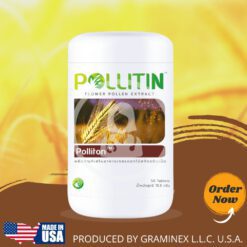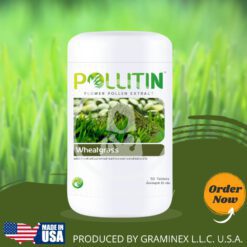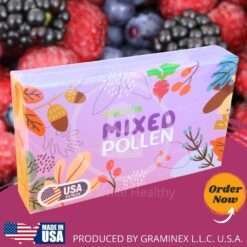Ingredient, Rye Grass
Rye grass flower pollen
Rye grass flower pollen is derived from the flowers of perennial ryegrass (Lolium perenne), a species belonging to the Poaceae family. This grass is primarily cultivated for its high-quality forage and is commonly found in temperate regions around the world. Its ability to adapt to various soils and climates makes it a preferred choice for farmers and gardeners alike, often planted in pastures, lawns, and sports fields. The pollen collected from ryegrass flowers is considered a potent natural supplement, celebrated for its rich nutritional composition.
The collection of rye grass flower pollen typically occurs during the flowering season, which may vary according to geographical location. The optimal time for harvesting the pollen is usually when the flowers are fully mature, as this is when they release the highest quantities of pollen grains. The harvesting process employs specific techniques, including mechanical collectors that gently sift through the flowering heads to capture the delicate pollen without damaging the plant. This ensures that the integrity of the ryegrass ecosystem is maintained, contributing to its vital role in supporting pollinator populations, especially bees.
Nutritionally, rye grass flower pollen is a powerhouse of vitamins, minerals, and proteins. It contains essential amino acids and a variety of antioxidants, making it a valuable addition to dietary regimens. The organic attributes of this pollen supplement highlight its appeal to health-conscious consumers seeking natural remedies. Beyond its health benefits, ryegrass serves an ecological purpose by providing sustenance and habitat for bees and other pollinators, thereby aiding in biodiversity and plant reproduction. This symbiotic relationship underscores the importance of preserving such plant species and their associated products.
Nutritional Profile of Rye Grass Flower Pollen
Rye grass flower pollen is gaining attention as a nutritional powerhouse, offering a wide range of beneficial components that contribute to overall health and wellness. This natural supplement is rich in proteins, vitamins, and minerals, making it a substantial addition to dietary regimens. Protein content in rye grass pollen is particularly noteworthy, as it provides essential amino acids necessary for various bodily functions, including muscle repair and enzyme production.
In terms of vitamins, rye grass flower pollen boasts a collection of vital nutrients such as B vitamins, which play a crucial role in energy metabolism, and vitamin C, known for its antioxidant properties. Antioxidants are important for mitigating oxidative stress, thereby supporting immune function. The unique combination of these vitamins makes rye grass pollen an effective supplement for individuals seeking to enhance their overall vitality and energy levels.
Furthermore, rye grass pollen is a source of important minerals like zinc, magnesium, and iron, all of which are integral to numerous physiological processes. Zinc, for instance, is recognized for its role in immune health, while magnesium contributes to muscle function and energy production. The presence of iron in rye grass pollen aids in oxygen transport within the body, enhancing physical performance and endurance.
When compared to other pollen types, such as bee pollen or flower pollen from various species, rye grass flower pollen shows a unique nutritional profile that sets it apart. While each type of pollen possesses its specific benefits, rye grass pollen stands out due to its balanced composition of nutrients, which collectively work to promote better digestion and bolster the immune system. Overall, the various nutritional components present in rye grass flower pollen support a holistic approach to health and well-being.
Health Benefits of Supplementing with Rye Grass Flower Pollen
Rye grass flower pollen has garnered attention as a dietary supplement due to its myriad health benefits. One of the notable advantages of incorporating rye grass flower pollen into one’s diet is its potential anti-inflammatory properties. Inflammation is a common underlying factor in numerous health issues, and research suggests that the components in rye grass flower pollen, including flavonoids and carotenoids, may help to mitigate inflammatory responses in the body. This could be particularly beneficial for individuals suffering from chronic inflammatory conditions.
Additionally, rye grass flower pollen has demonstrated positive effects on respiratory health. Several studies have indicated that pollen extract can support lung function and may alleviate symptoms associated with respiratory conditions, such as asthma and allergic rhinitis. The bioactive compounds present in the pollen are believed to enhance mucosal immunity and reduce allergic responses, presenting a natural option for improving respiratory health.
In the realm of athletic performance, rye grass flower pollen is also gaining popularity. Athletes and fitness enthusiasts have reported improved endurance and recovery times when using pollen supplements. Some research studies have hinted at the ability of rye grass flower pollen to enhance physical performance by increasing energy levels and supporting muscle recovery, which may be attributed to the rich nutrient profile of the pollen.
It is important to consider that while rye grass flower pollen offers various health benefits, individuals should be aware of potential side effects or contraindications. Allergies to pollen or certain plants may provoke adverse reactions. Consulting a healthcare professional prior to commencing supplementation is advisable, especially for individuals with a history of allergic conditions.
How to Incorporate Rye Grass Flower Pollen into Your Diet
Incorporating rye grass flower pollen into your diet is a straightforward process that can significantly enhance your nutritional intake. First and foremost, it is imperative to determine the appropriate dosage of rye grass pollen. Generally, a daily intake of 1 to 2 teaspoons (approximately 5 to 10 grams) is recommended to experience the potential health benefits. However, individuals should consult a healthcare professional before starting any new supplement, especially if they have underlying health conditions or allergies.
When choosing rye grass flower pollen supplements, opt for high-quality products from reputable brands. Look for supplements that assure purity, do not contain fillers or additives, and come with third-party certifications. This ensures that you are receiving concentrated pollen, maximizing its health benefits. Products available in powdered form can also be an excellent choice, as they allow for versatile usage.
There are numerous ways to incorporate this superfood into your meals. One popular method is to mix rye grass flower pollen into smoothies, where it complements fruits and vegetables nicely while providing an extra nutritional boost. Alternatively, rye grass pollen can be added to yogurt, enhancing both its flavor and nutritional profile. For baking enthusiasts, integrating pollen into baked goods, such as muffins or bread, can be an enjoyable way to enjoy its benefits.
For those looking to enhance the flavor and benefits of rye grass pollen, pairing it with other superfoods can be advantageous. For instance, combining it with honey can create a delicious topping for various dishes, while blending it with nuts or seeds offers added protein and healthy fats. By experimenting with different combinations, individuals can discover unique flavors and health benefits that complement their dietary preferences, ensuring a practical and enjoyable integration of rye grass flower pollen into daily meals.







Recommended Products
Acid Reflux Health Care Set1
Acid Reflux Health Care Set 2
Enhance Immune Balance Health Care Set
Muscle Weakness Health Care Set#1